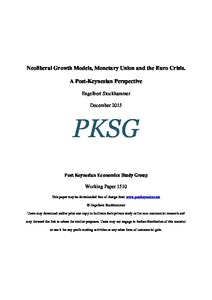Neoliberal growth models, monetary union and the Euro crisis. A post-Keynesian perspective
"The paper offers an account of the Euro crisis based on post-Keynesian monetary theory and its typology of demand regimes. Neoliberalism has transformed social and financial relations in Europe but it has not given rise to a sustained profit-led growth process. Instead, growth has relied eithe...
| Main Authors: | , |
|---|---|
| Institution: | ETUI-European Trade Union Institute |
| Format: | TEXT |
| Language: | English |
| Published: |
Durham
2015
PKSG |
| Subjects: | |
| Online Access: | https://www.labourline.org/KENTIKA-19107833124919250159-Neoliberal-growth-models,-mone.htm |
| Summary: | "The paper offers an account of the Euro crisis based on post-Keynesian monetary theory and its typology of demand regimes. Neoliberalism has transformed social and financial relations in Europe but it has not given rise to a sustained profit-led growth process. Instead, growth has relied either on financial bubbles and rising household debt ('debt-driven growth') or on net exports ('export-driven growth'). In Europe the financial crisis has been amplified by an economic policy architecture (the Stability and Growth Pact) that aimed at restricting the role of fiscal policy and monetary policy. This neoliberal economic policy regime in conjunction with the separation of monetary and fiscal spheres has turned the financial crisis of 2007 into a sovereign debt crisis in southern Europe." |
|---|---|
| Physical Description: | 34 p. Digital |

